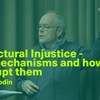interrupted
Mark Jaccard: Economic Efficiency vs Political Acceptability Trade-offs in GHG-reduction Policies
Mark Jaccard, Professor in the School of Resource and Environmental Management at Simon Fraser University, VancouverAbstractThere are obvious reasons why for three decades most jurisdictions have failPublic surveys and observation of real-world GHG reduction successes suggest that explicit carbon pricing (carbon tax and perhaps cap-and-trade) can be substantially more politically difficult than certain regulatory policies for shifting the energy system on to a deep decarbonization trajectory. Nonetheless, some people have argued that carbon pricing is an essential GHG reduction policy, suggesting that sincere politicians must do carbon pricing no matter how politically difficult. But the claim that carbon pricing is essential is factually incorrect. Deep decarbonization can be achieved entirely with regulations. Regulatory policies are unlikely to be as economically efficient as carbon pricing. But not all regulations perform identically when it comes to the economic-efficiency criterion. Flexible regulations have some attributes that make them low cost relative to regulations that require adoption of specific technologies.This talk provides evidence that assesses both the relative economic efficiency of policies and their relative political acceptability. The findings reported here suggest that some kinds of flexible regulations can perform significantly better than explicit carbon pricing in terms of relative political cost per tonne reduced while performing only marginally worse in terms of economic cost per tonne reduced. Presumably, this type of trade-off information could be of value to politicians who sincerely want deep decarbonization but would also like to be rewarded with re-election so that they and competing politicians see the value in ambitious and sustained GHG reduction efforts.
Legitimacy at sea. Authority and extraterritorial border controls
Critical Review of International Social and Political Philosophy Abstract This paper examines the legitimacy of extraterritorial border controls, specifically maritime interceptions, through the lens of
Bob Goodin: Structural injustice - its mechanisms and how to disrupt them
Place:At the Institute for Futures Studies, Holländargatan 13, Stockholm, or online. Research seminar with Bob Goodin Distinguished Professor of Philosophy and Social and Political theory at the Austra for his "acuity and success endeavored to blend political philosophy with empirical political science to increase the understanding of how decent and dignified societies can be shaped.wherehowmechanismsJoin the seminar online or at the Institute for Futures Studies. If you will join on site, please check the box in the .

Bob Goodin: Structural injustice - its mechanisms and how to disrupt them
Injustices that are, in the first instance, brute acts of clearly identifiable individuals are often perpetuated, more subtly, through seemingly innocent workings of anonymous and innocuous social str
The Naturalistic Fallacy Intuition
Kimmo Eriksson, Mälardalen University According to social intuitionist research, moral (or “injunctive”) norms are often not rationally motivated. Where do these norms come from then? We propose that o
Completed: Criminal networks and social organizing
How does criminal organization, for example in street gangs, arise? By understanding how the networks work, we can also suggest crime prevention strategies.
Digital fist bumps: searching for datafication and digitalisation in everyday CrossFit coaching practice
Frontiers in Sports and Active Living Abstract The research presented here explores the nuances of data collection and sharing via digital platforms in everyday CrossFit coaching practice. There is a gr
Tobias Hübinette: The modern history of Swedish whiteness and Swedish race thinking
Tobias Hübinette is Associate Professor in Intercultural Education and a Senior Lecturer in Intercultural Studies at Karlstad University. ABSTRACTThis presentation aims at understanding today's situati
On algorithmic mediations
European Journal of Social Theory Abstract In this article, the main focus will be to analyze the notion of mediation in an attempt to apply it to one of the major topics of our time: the increasing imp
Is risk aversion irrational? Examining the “fallacy” of large numbers
Synthese, doi.org/10.1007/s11229-018-01929-5 Abstract A moderately risk averse person may turn down a 50/50 gamble that either results in her winning $200 or losing $100. Such behaviour seems rational i








